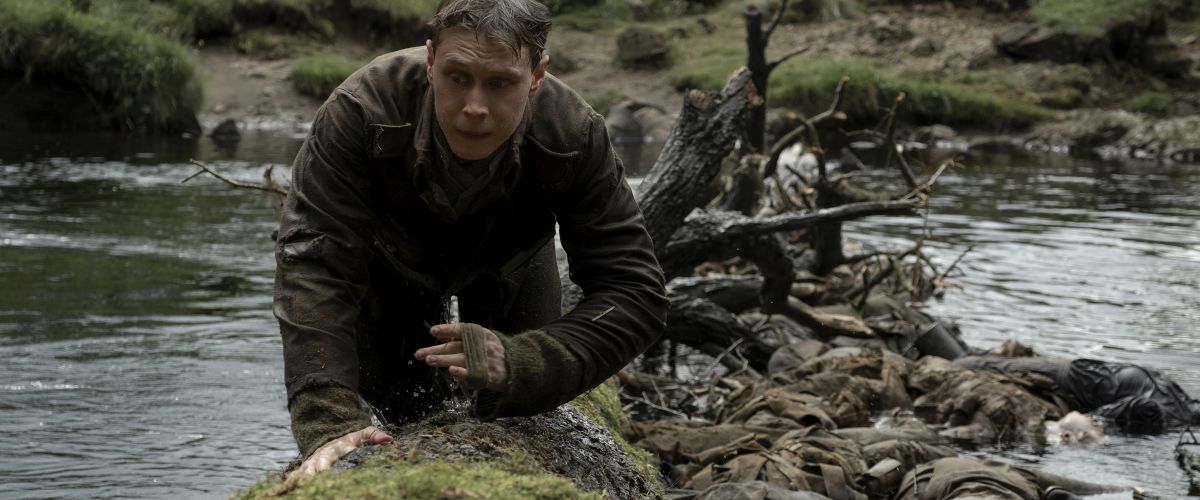Producer Pippa Harris recently sat down with ComingSoon.net to discuss the challenges of making the epic, Oscar-winning war film 1917, which is now available on Digital HD as well as 4k/Blu-ray. She also discusses her long-running partnership with Sam Mendes and what it’s like working with the great Roger Deakins. Check out the interview below, and click here to purchase 1917 on Blu-ray!
RELATED: CS Soapbox: Is 1917 the Greatest World War I Movie Ever Made?
At the height of the First World War, two young British soldiers, Schofield (Captain Fantastic’s George MacKay) and Blake (Game of Thrones’ Dean-Charles Chapman) are given a seemingly impossible mission. In a race against time, they must cross enemy territory and deliver a message that will stop a deadly attack on hundreds of soldiers—Blake’s own brother among them.
Benedict Cumberbatch (Doctor Strange), Colin Firth (Mary Poppins Returns), and Richard Madden (Game of Thrones) and Mark Strong (Shazam!) star in the film. Other additions to the cast include Andrew Scott, Daniel Mays, Adrian Scarborough, Jamie Parker, Nabhaan Rizwan, Claire Duburcq, George MacKay and Dean-Charles Chapman.
1917 is directed by Sam Mendes, who wrote the screenplay with Krysty Wilson-Cairns (Showtime’s Penny Dreadful). The film is produced by Mendes and Pippa Harris (co-executive producer, Revolutionary Road; executive producer, Away We Go) for their Neal Street Productions, Jayne-Ann Tenggren (co-producer, The Rhythm Section; associate producer, Spectre), Callum McDougall (executive producer, Mary Poppins Returns, Skyfall) and Brian Oliver (executive producer, Rocketman; Black Swan).
The film is produced by Neal Street Productions for DreamWorks Pictures in association with New Republic Picture, with Universal and Amblin Partners distributing the film internationally and eOne distributing on behalf of Amblin in the U.K.
RELATED: CS Soapbox: Is 1917 the Greatest World War I Movie Ever Made?
ComingSoon.net: I really appreciate you taking the time to talk to me about the film 1917. I just want to say right off the bat, congratulations on the film’s success. I saw it. I loved it. I thought it was a great film, and a wonderful technical achievement for you guys.
Pippa Harris: Thank you, thank you very much.
CS: Speaking of the technical aspects of the film, specifically the long, one-take shot, was that how the film was originally setup? Or was that something that was introduced later on?
Harris: No, that was right from the get-go. So the very first outline that Sam did, in that outline on the first page it said, “The film will appear to be one continuous shot.” So I think from the very first time he started thinking about it, that was what he saw in his mind’s eye. And initially, obviously, he wrote the outline on his own, but then after we discussed it, we thought it would probably make sense to bring in another writer, and that’s when Krysty Wilson-Cairns came in. So from the very beginning, it was always intended to be shot that way.
CS: What was your initial reaction to that? Were you daunted by the challenge?
Harris: No, I was completely on board with it. I think that I just thought it was a fascinating idea, and I think if I’m totally honest, I didn’t quite anticipate some of the challenges that it would throw up further down the line, where we started production. It just felt like a very immediate and visceral way to tell a story. And I totally understood Sam’s desire, because the irst World War is such a big conflict and it’s on such a massive scale, that he wanted to be able to tell this story in a very intimate way in order to set it against that big backdrop. So it totally made sense to me that you would try and shoot it in this way.
CS: What were some of the challenges that popped up throughout the production?
Harris: Well, I mean, the whole shooting as one shot, once you start thinking about that, and of course, as soon as Roger Deakins was on board and we started discussing it, Roger very early on said, “Well, of course we won’t be able to light this,” because a lot of the locations are exteriors. And if we’re doing this as a single shot, there won’t be anywhere to put the lights that is going to be, as it were, out of the way. And so, that’s going to mean that we need the natural light to be consistent through the movie. We can’t have bright sunshine for one scene and then a dark cloud for the next because it’s meant to be shot at the same time. So you’re going to need a uniformity of weather. And of course, normally, weather is always an issue, if you have a large number of exteriors. But normally, you can cut around it, so you can turn a scene that’s meant to be sunny, you can always shoot that in rain. It doesn’t really matter because you can just say it’s a different day. We couldn’t do any of that. Nor could we cut away and shoot material, lots of interior material because we didn’t have interior sets. We only had a few interior sets, the various bunkers that people were in and the cellar sequence when George meets the French girl in the cellar.
So it had this double whammy of knowing we needed natural light, and then knowing we needed the weather to be consistent. So we all became obsessed by the weather. We all had different weather apps on our phones and we had a special guy that we used to phone every morning. He was a sort of weather wrangler, who would tell us exactly what moment in the day the cloud cover was going to come over, and depending on where we were and the wind speed. So it became a sort of, as far as it could be, a science of anticipating exactly the moment where we’d be able to get the shot. But in a way, that added to the exhilaration of shooting because it meant that when the conditions were right, you had to go. We had to all be prepped and ready to go when the weather was right, so that in and of itself was kind of exhilarating.
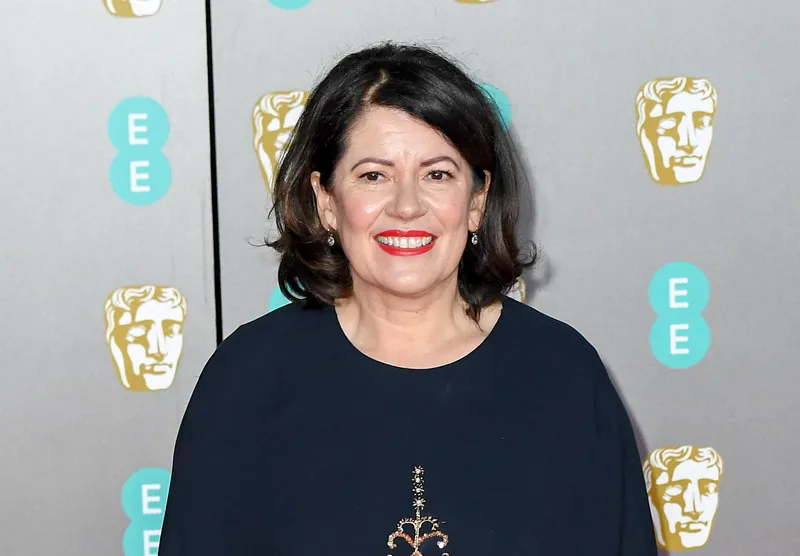
CS: Would you say this is the most challenging production you’ve ever worked on?
Harris: Yes, it was, because it felt like we were in uncharted territory. It felt like none of us had obviously shot in this way before, so we didn’t quite know the answers to every question. But what was really exciting about it was that it felt more collaborative, I would say, than other films I’ve worked on because everyone was working together and dependent on each other, and we were all sort of problem solving at the same time, so the design department were working very closely with the production team and the locations department and the actors and Krysty herself, who was the co-writer with Sam, all of us were in contact the whole time every day because we were sort of inching forward in terms of our prep.
The other thing that was unusual was we had a long prep period with the actors. Quite often, when you work on a big movie, you simply can’t get the actors much before your shoot dates because they’re not available. And we were very lucky that George and Dean were available and very keen to do rehearsals. So they came on board months before we started shooting, and obviously did a certain amount of physical training, but also just got into the rhythm of the scenes so that they knew the scenes inside out. And by the time we actually started shooting, they sort of just inhabited those two characters with an incredible amount of ease and skill. They really just lived the scenes as they were shooting them.
CS: Speaking of George and Dean, both actors convey a very particular sense of innocence as they’re walking through this harsh landscape that contrasts their young, boyish looks. Was that one of the key aspects of casting the roles?
Harris: Yeah, well, we knew that they had to be both very young, but also that we wanted there to be a difference between them, so I think there was a sense in which Schofield, George’s character, is a more experienced, more world weary soldier. He’s seen more than Blake has. He’s been there for longer. And I think George manages to convey that. He has a kind of a sort of British reserve to him, which feels entirely truthful, whereas Blake is a more open, he’s more of a cheeky chappy, who’s cracking jokes and trying to make people laugh. And he’s still got a kind of level of enthusiasm to him, which George’s enthusiasm has clearly worn off the longer he’s been there. So it was very important that they felt different from each other, but as you say, both equally innocent in terms of the grand scheme of the war and heartbreaking because of that.
CS: What’s it like working with somebody like Roger Deakins?
Harris: Well, it’s amazing, working with him. He’s the greatest living cinematographer, and we’ve both worked with him a number of times before, so we love working with him. And Sam in particular has an almost telepathic relationship with him. You know, they know each other so well that they can kind of anticipate what the other’s going to think at any given moment, and they work extremely well together. Sam can almost, just with the flick of his eyebrow, sort of say to Roger that something’s working and vice versa. So, they have a very, very good working relationship.
CS: Were you surprised by the universal acclaim 1917 received from both critics and audiences?
Harris: No, I mean, the whole awards thing, to be honest, sort of took us all by surprise because we’d only just finished the film. We finished in October, I think two days before we screened for the HFPA. So we were kind of exhausted because we’d just finished quite a tight post-schedule, and we were just thrilled to manage to deliver the movie on time. And then, we went on this sort of rollercoaster journey of winning at the Globes and BAFTAs and getting the three Oscar wins. So it’s been an extraordinary few months, really, like nothing else. And really, really delightful because we have this, unlike a lot of the other films, we were on release at the same time, so as well as people being nice and giving us gold statuettes at various ceremonies, the reason we’d made the film was for a broad audience to go and see it in the cinemas. And that was what was happening at the same time. So it was a really wonderful few months.
CS: After going through that whirlwind, what’s the process that you go through to prepare for the next film? Is it a manner of trying to top yourself after this one? Or is it a matter of just finding the right script and going with that?
Harris: Yeah, as a company, Sam and I do a mix of film and TV and theater, so what’s great is that we straightaway, our next project is moving the Lehman Trilogy, which is a play that we had on at the National Theatre here and is opening on Broadway in a couple of weeks. So Sam’s gone straight into that, we’re rehearsing that. And we do a lot of TV, so we’ve just wrapped on the new series of Penny Dreadful, and we have another series of Britannia, which we make for Sky and another series called The Midwife that we make for the BBC, so we’re just busy on all fronts. And yeah, in terms of film, it’s just waiting to sort of see which of the various things we’ve got in development bubbles up and feels like the right thing to do next.
CS: Can you talk about your collaboration with Sam Mendes?
Harris: Well, it’s great. I mean, we’ve been sort of best friends since we were children, so I was 11 when I met him, and I’m 50 something now, so we have a kind of very close working relationship and friendship. So no, that’s great and in our company, we’ve had now for nearly 20 years and it’s still a relatively small company with the same people that have worked with us all that time. So it’s great. We have a terrific working relationship.
CS: What do you want people to take away from 1917?
Harris: Well, I think there were lots of things we wanted the film to convey, but I suppose for me, and this may be slightly with hindsight now, looking around the world and where we are, it’s just not to take peace for granted, that I think it’s just really important when you see how hard won that peace after the First World War was, and then again after the Second World War, that we should never take it for granted and allow ourselves to slip back into those types of conflicts and divisions. So I think that’s the thing I would want people to take away.
(Photo Credit: Getty Images)
1917 Official Photos
-
1917_tsr1sheet_rgb1

-
1917
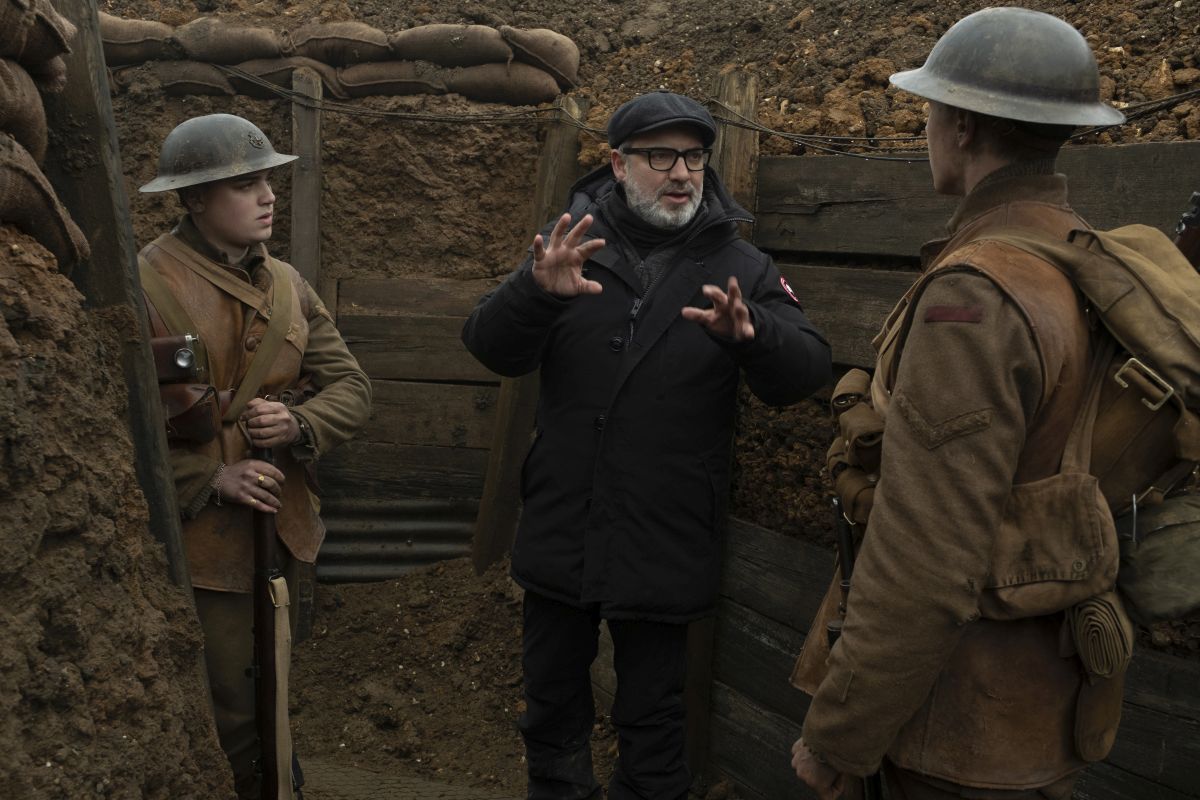
-
1917 (2019)

(from left) Blake (Dean-Charles Chapman) and Schofield (George MacKay) in 1917, the new epic from Oscar®-winning filmmaker Sam Mendes. -
1917 (2019)

(from left) Dean-Charles Chapman, George MacKay and Oscar®-winning filmmaker Sam Mendes on the set of the new epic, 1917. -
1917
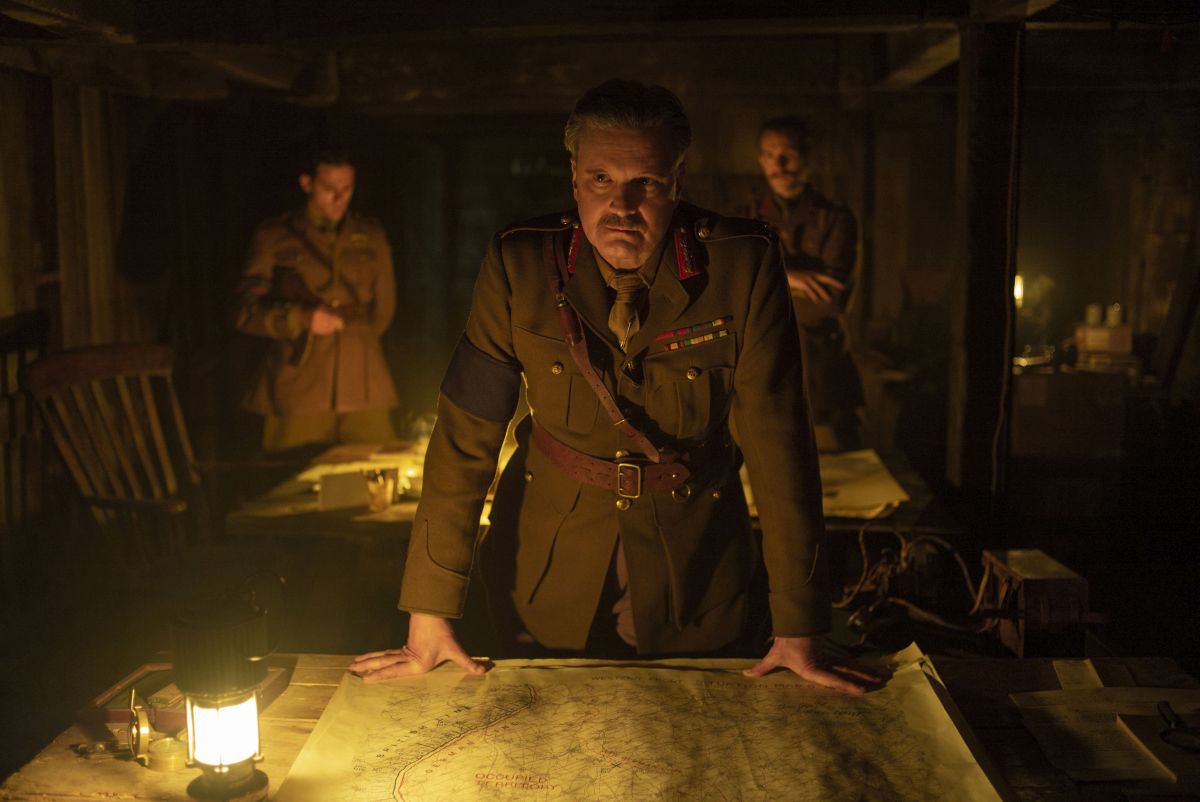
Colin Firth as General Erinmore in 1917, the new epic from Oscar®-winning filmmaker Sam Mendes. -
1917 (2019)
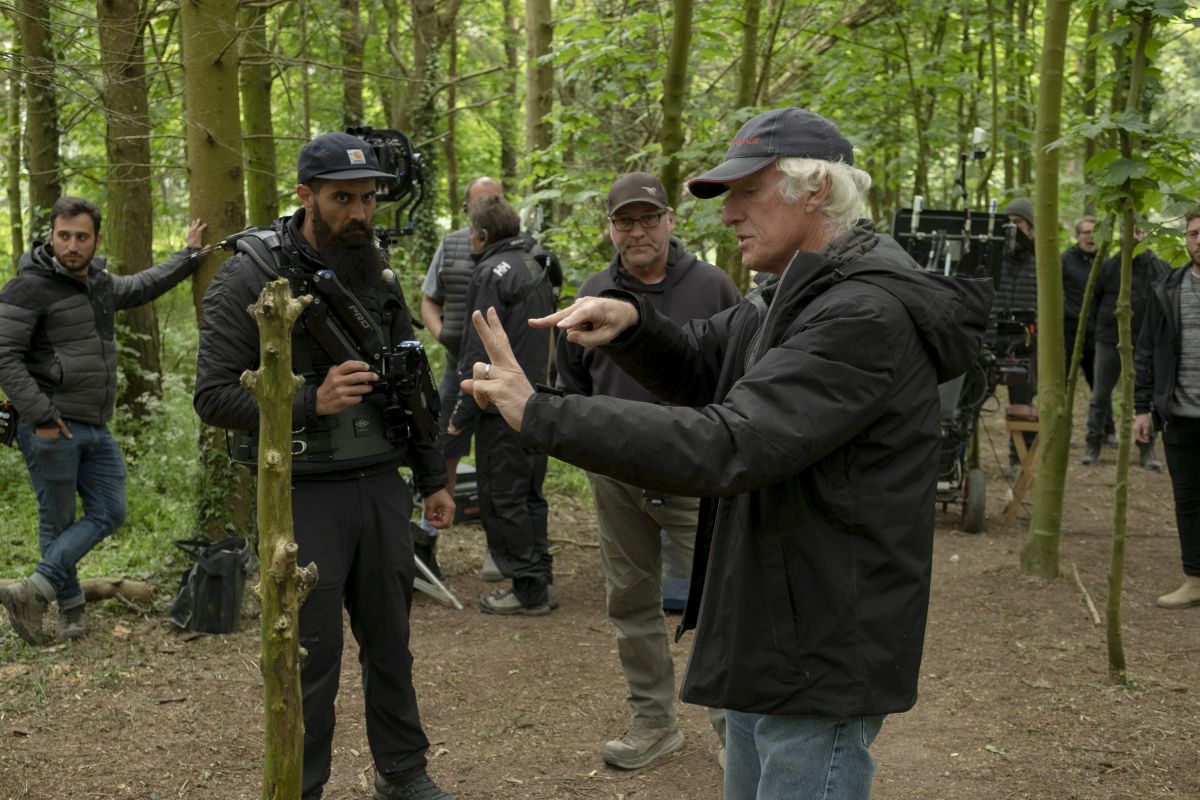
(foreground) Cinematographer Roger Deakins on the set of 1917, the new epic from Oscar®-winning filmmaker Sam Mendes. -
1917 (2019)
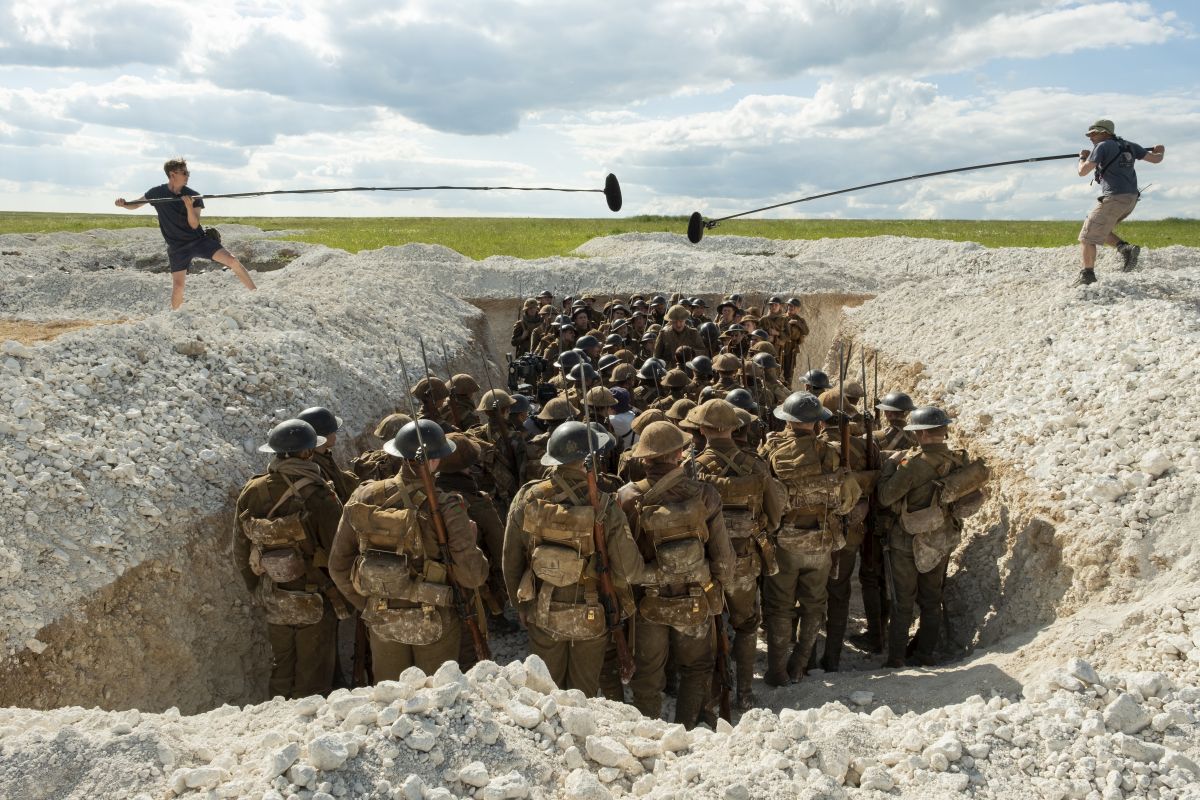
Cast and crew members on the set of 1917, the new epic from Oscar®-winning filmmaker Sam Mendes. -
1917 (2019)
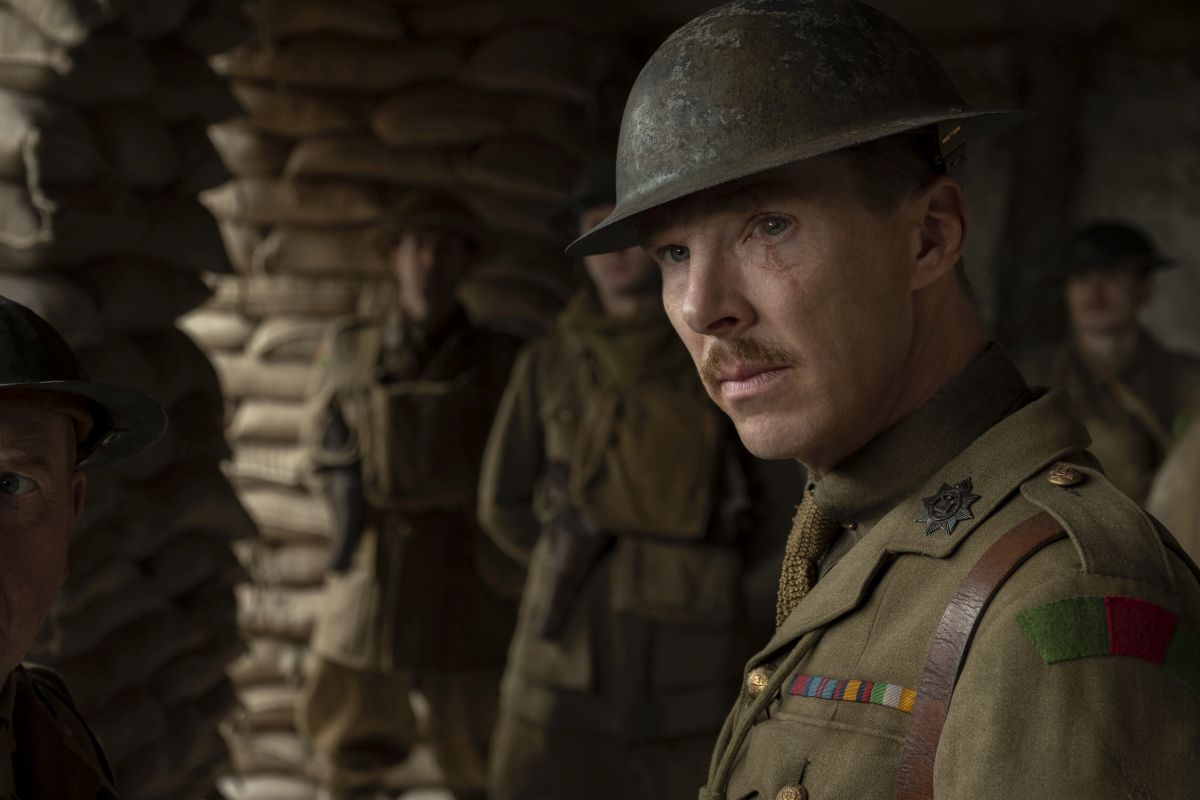
Benedict Cumberbatch as Colonel Mackenzie in 1917, the new epic from Oscar®-winning filmmaker Sam Mendes. -
1917 (2019)
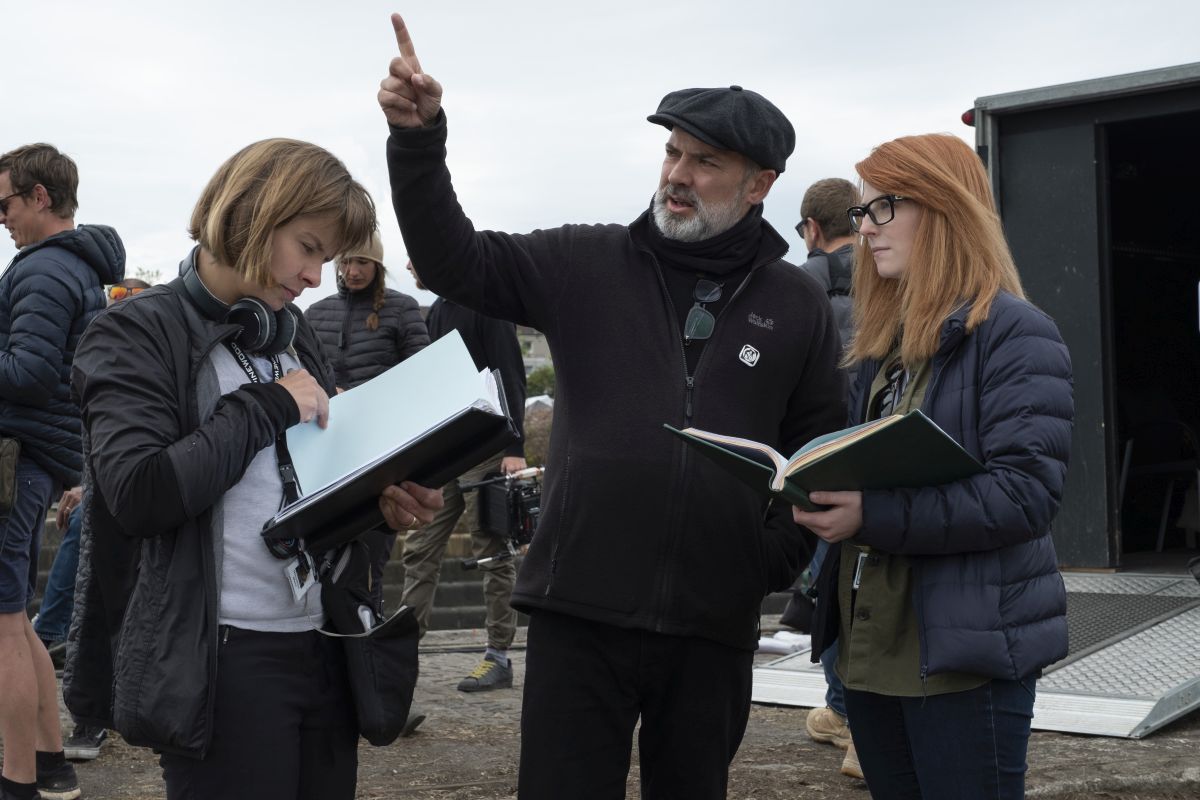
Script supervisor Nicoletta Mani (left) and co-screenwriter Krysty Wilson-Cairns (right) with Oscar®-winning filmmaker Sam Mendes on the set of Mendes’ new epic, 1917. -
1917 (2019)
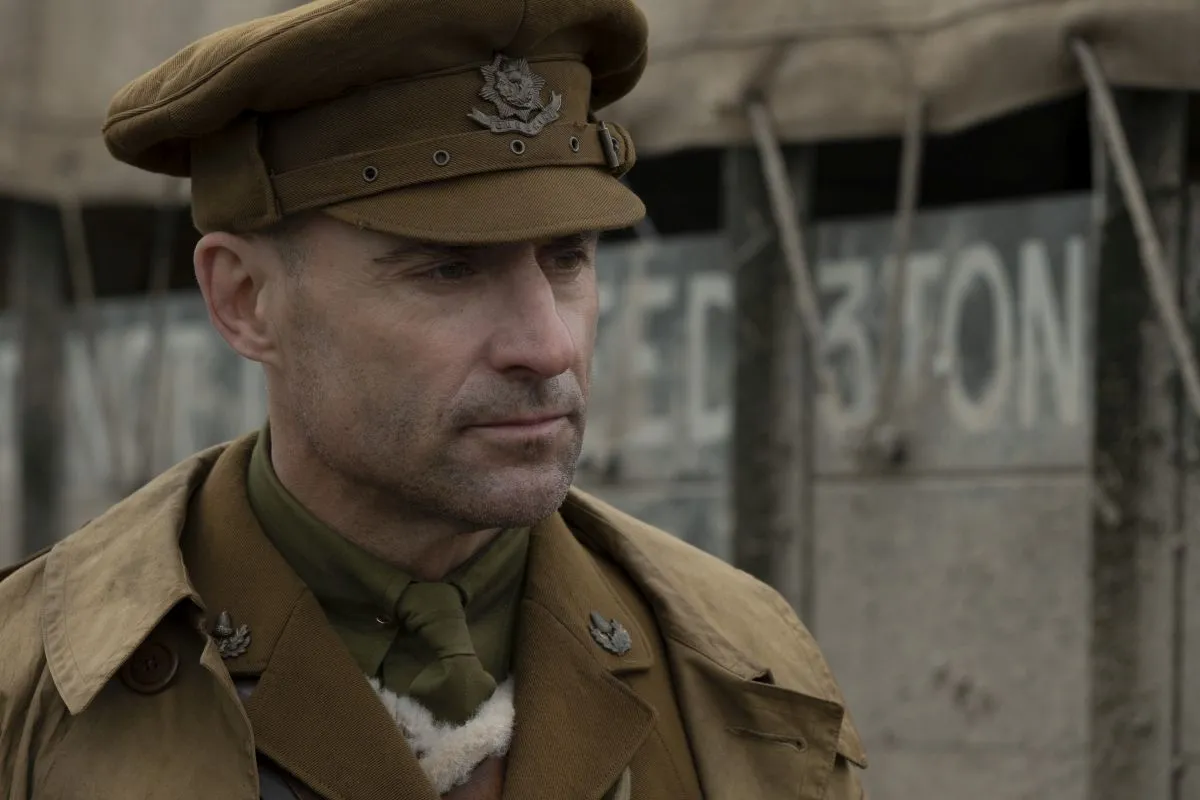
Mark Strong as Captain Smith in 1917, the new epic from Oscar®-winning filmmaker Sam Mendes. -
1917
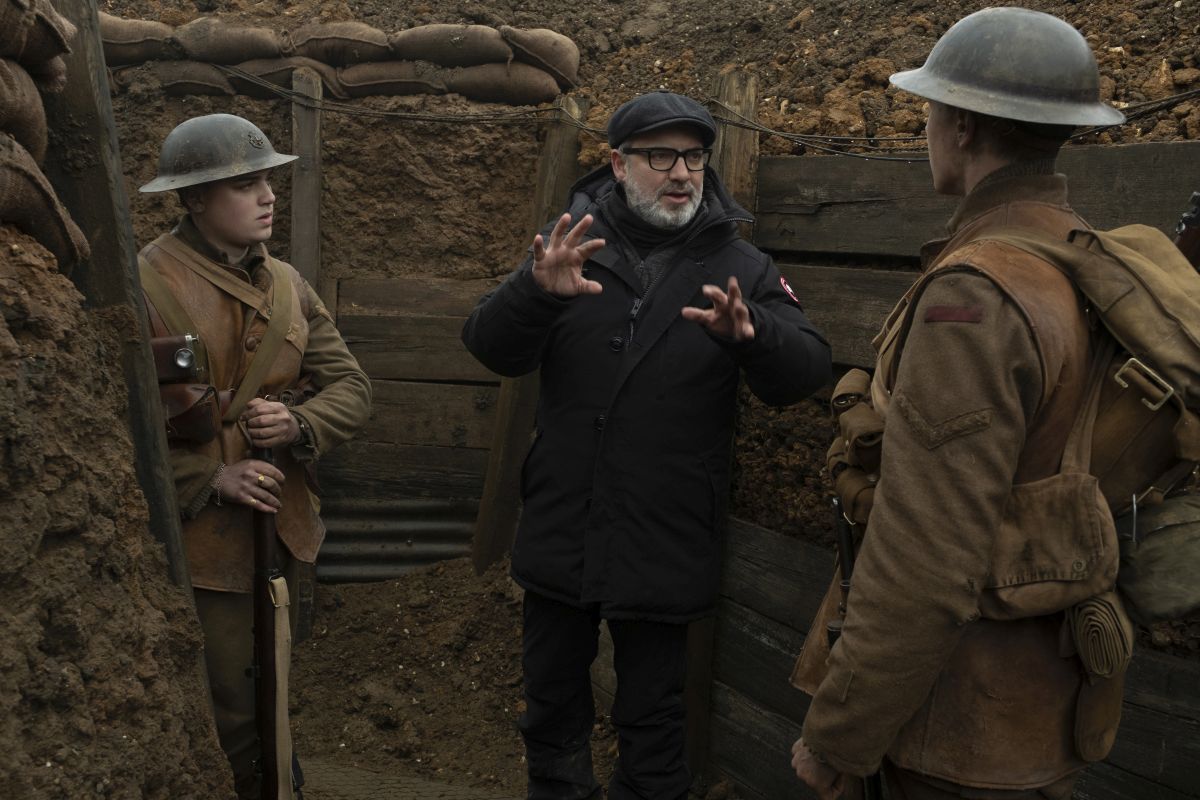
-
1917

-
1917
